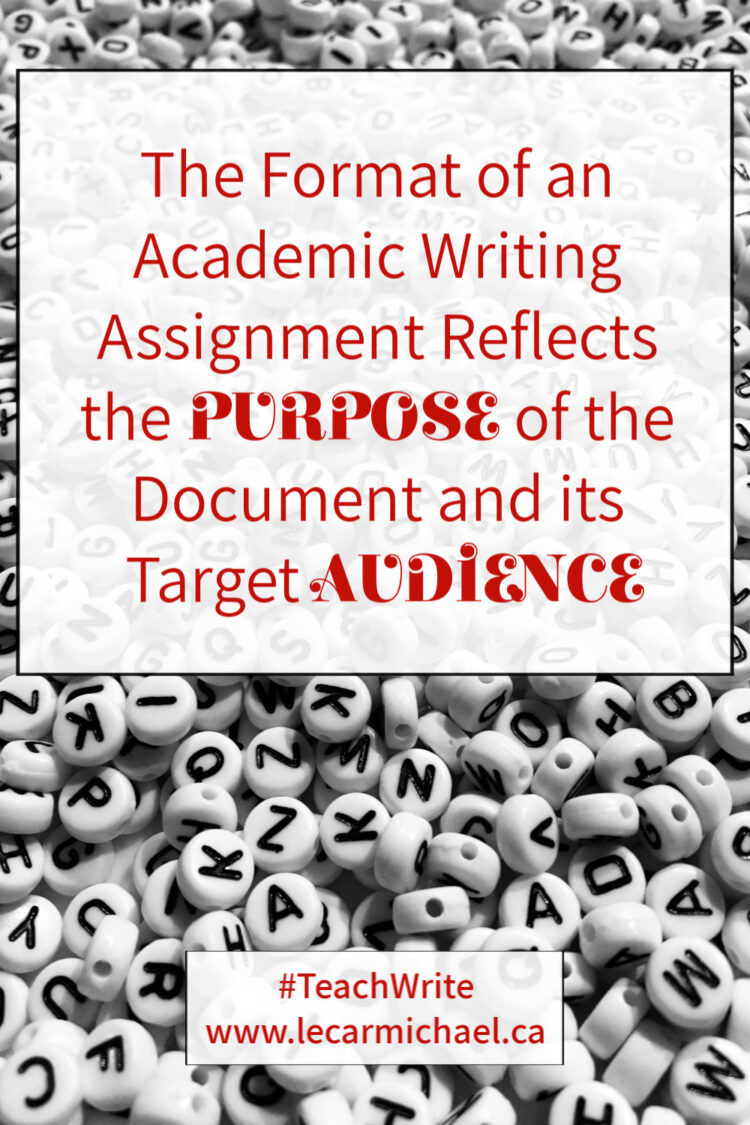 Welcome to Teach Write! This column draws on my 20 years’ experience teaching writing to kids, university students, and adult learners. It includes ideas and exercises that teachers can use in the classroom, and creative writers can use to level up their process.
Welcome to Teach Write! This column draws on my 20 years’ experience teaching writing to kids, university students, and adult learners. It includes ideas and exercises that teachers can use in the classroom, and creative writers can use to level up their process.
Last time, I talked about the purpose of the most popular form of academic writing – the argumentative essay. You can also read about the distinct (but closely related) purposes of lab reports and scientific papers here. If you’re a student, however, you’ll probably be assigned several other types of documents, and today we’re going to take a quick peak at the goals of those.
Critical Analysis
The goal of a critical analysis is to break down a published paper, identifying its strengths and weaknesses. Key point: both strengths and weaknesses. The most common error I’ve seen in these types of papers is focusing entirely on weakness and overlooking strengths. It’s very important to keep in mind the purpose of the type of document you’re analyzing – if you know what an argumentative essay is supposed to do, you’ll have more luck figuring out whether the one you’re writing about is actually successful.
Science students often ask me what to do if the results of the experiment they are analyzing turn out to be wrong. True story: that happened to me when I was an undergraduate! I found a second experiment that directly contradicted the paper I was writing about. With a little further research, I figured out that my focal paper was incorrect, but also why the experiment had given a false result. And let me tell you, if you can do the same, your instructor will be seriously impressed.
Hot tip: when choosing your focal paper for a critical analysis, read newer papers that cite your paper – you’re allowed to reference other people’s opinions in your own analysis.
Literature Reviews
A lit review is a research paper that provides a summary of existing scholarship on a topic. The goal is to provide an up-to-date overview of what we already know, and what questions still remain to be answered. The audience (remember when we talked about audience?) is people who are familiar with the field (for example, microbiology), but might not know much about this particular subtopic (for example, designer bacteria for cleaning up oil spills).
Because lit reviews typically follow a chronological structure, one of the biggest mistakes people make when writing them is to fall into a “This happened, and then this happened, and then this happened” pattern. Remember that part of the goal is always to show your instructor that you understand your research: context, synthesis, and a point of view matter just as much as summary.
Annotated Bibliography
This is basically “lit review light” and might actually be assigned as an early stage of your total assignment. In addition to providing citation information for your sources, you will give a short summary of the main points of each source. Short is the operative word – focus on major ideas that relate to your overall assignment. As always, there are two goals: a) to direct researchers in your field to useful sources of information, and b) to prove to your instructor that you actually did the reading!
Case Study
These are more commonly assigned in business or medical degree programs, so I have less direct experience with them. Generally speaking, you’ll be given a scenario, asked to analyze it in the context of theory in your field, and required to provide recommendations for action. Case studies test your ability to relate theory to the real world, so your goal will be to demonstrate that you understand how principles are used in practice.
Final Thoughts…
After essays and lab reports, these are the most common assignment types I’ve encountered in my decades as an academic writer and writing instructor. We’ll be looking at personal statements and letters of intent in a later post, but let me know if there are other genres you’d like to see discussed in this column. Also bear in mind that your assignment may involve a new and exciting hybrid of any of these elements. If you’re ever in doubt about what you’re being asked to do, always check with your instructor before you start.
Happy writing!
Hey, did you know I teach writing workshops? It’s true – I work with adult writers, teachers, and students of all ages. Contact me to learn more.